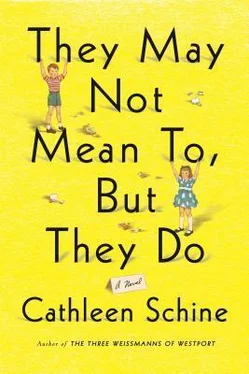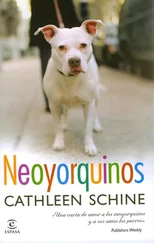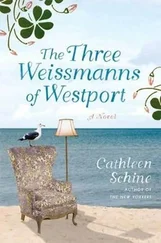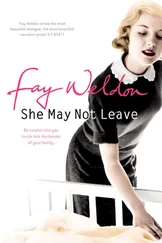Molly gave her a baleful look.
“Oh, I didn’t mean that. Of course you have to go back to be with Freddie. I’m selfish, I admit it, but I look forward all year to spending this time with you, Molly.”
“But if you’re not even going to be here, what difference does it make if I go home to L.A.?”
“I have to be honest,” Joy said.
* * *
Ben climbed into Mr. Bailey’s old limo next to his grandmother and Gatto.
“Stay here, Bennie. You have a whole day before you have to be back. I don’t want to cut your time in the country short.”
He shrugged. “Mom’s leaving, you’re leaving, it’s awkward now anyway. Everyone is so upset.”
He carried her bag up the steps to the platform.
“You’re a good boy,” she said, but she might have been talking to the dog.
She was silent then, until they were on the train. “I was having a temper tantrum,” she said. “That’s all.”
“So was Uncle Daniel. And Mom, too.”
Ben thought back to his own temper tantrums.
“Do you see red when you get angry?” he asked.
“I think that expression has to do with bulls and the red cape the toreador swishes around.”
“But I see red. I always saw red when I had temper tantrums when I was little.” A soft dark red screen, behind it the grown-ups above him talking and talking, hollering, but no sound coming through, just the rush of blood in his ears, red blood — that’s how he remembered his childhood tantrums. And he’d had quite a few of them.
“At least your father and I don’t kick,” his grandmother was saying. “You were a kicker.”
He sensed that she had started to cry and he turned away, staring out the window at the weedy cliffs rushing by. Then he turned back and wrapped her in his arms and let her weep against his chest. He wondered if this was what it meant to be an adult, to be on the other side of the tantrum.
Joy decided she was not speaking to either Danny or Molly.
“I have never played favorites,” she told Natalie proudly when she got back to New York. “I’m not going to start now.”
Natalie was the only one of the girls in town. She never left New York City, nor could she understand those who did. But since neither Joy nor Natalie wanted to venture out in the heat, they might as well have been in different countries. They were speaking on the phone, each in her air-conditioned bedroom.
“I’m surprised they didn’t follow you into town. As chaperones.”
“First they want me to stop grieving. Then they think I’m not grieving enough.”
Joy was angry, but the silent treatment was difficult for her to maintain. She wondered how Freddie’s father was. And she wanted to tell Molly about the deliveryman (the turkey burger she ordered was too dry, but she put sliced tomatoes on it and microwaved it and it was delicious), the same deliveryman she’d given the scarf to. She’d asked if he was cold and wanted another scarf, and they had laughed and laughed. Then, too, she wanted to call Danny to tell him about the letter Ruby had written her and stuffed in her suitcase begging her to send candy to camp immediately, it was an emergency, this way it would be there when Ruby arrived, and it should be flat and hidden inside a magazine or book. Danny had done the same thing when he went to camp. Some things never changed.
Joy gave the telephone a poisonous glance. Never mind. Let them stew.
“She needs space?” Molly said when Ben answered the phone. “What does that mean? She’s not my boyfriend. We’re not twenty.”
“Mom,” Ben said, “she needs some time on her own.”
“ You’re there.”
“Just give her some time. It’s hard to be an old Jew, remember?”
Daniel called a few minutes later.
“She’s so sensitive. Honestly,” he said when Ben said she could not speak to him because she was too upset, and he hung up, his feelings hurt.
Joy was relieved that Karl was still in Rhode Island with his son. She could not imagine speaking to him, either. She was happy when Ben went out. She spent the day quietly, adjusting the air conditioners, looking for her glasses, reading the newspaper, petting the dog. The coffee shop delivered her meals. In the late evening, when it was less hot, she took a short, careful walk, Gatto under her arm. She could not remember the last time she had spent a summer day in the city. She could see the sunset between the buildings.
Coco called to try to make peace. Joy told Ben to tell her she would let her know if and when she was ready to negotiate.
When Freddie called, though, Joy got on the phone.
“I’m so sorry, dear. I hope your father recovers very quickly. It must be a nightmare for you. All that family. Family is a nightmare, isn’t it?”
She pictured Freddie surrounded by all her brothers and sisters. And nieces and nephews. And Molly. Was Molly standing right beside her?
“Is Molly there?”
“Yes. Do you want to talk to her? She’s very ashamed of herself. Aren’t you, Molly?”
Joy heard a mumbled assent.
“Very,” Freddie added.
“Well, then.”
“And she misses you. She can’t stand it that she hasn’t spoken to you.”
“She just got off the plane.”
“True. We’re going straight from the airport to the hospital to see my father.”
Joy sat down in the kitchen. There were so few cars on the street. No sirens. She thought of Freddie’s father in the hospital, in a coma, unable to speak to his daughters or his sons. And Freddie and Molly going to see him, to stand silently at his silent bedside.
“That’s good,” Joy said. “Good girls.”
And the feud was finished.
In the weeks that followed, Duncan’s grandchildren and sons and daughters-in-law all returned home, but Pamela and Laurel stayed on. Their father lay unconscious in a hospital bed, and they sat every day, one on either side of him, discussing the disposition of his property. Freddie explained to them that he had no property to speak of, but they spoke of it anyway. There was the jewelry, their mother’s jewelry, which had never been distributed. It was costume jewelry, but you never knew. And there were Duncan’s watches, vintage watches that had become valuable. Not to mention his life insurance, which was all paid up years ago, and his car.
“He sold the car after his last accident,” Freddie said.
“Well, then, the proceeds…”
“For scrap. He sold it for scrap. Can we discuss this somewhere else? Or not at all?”
“Oh, he can’t hear a thing, can you, Dad?” said Pamela. “And if you could, you wouldn’t mind, would you? He certainly can’t take care of all these details himself, Freddie.”
“We’re being practical,” Laurel said. “Someone has to.”
Freddie went to the hospital every day, too, but one day slid seamlessly into the next, her father the same, his chest moving up with great effort and, then, with equal effort, down. His cheeks had sunk into his skull, he got no better, he got no worse. Her sisters had moved out of their hotel room into his room at Green Garden.
“I know they’re going through his things,” Freddie told Molly. “It’s ghoulish.”
Molly was kind and distracted, the distraction perhaps making her kinder than she would ordinarily be. The argument with her mother had shaken her.
“It was only a day, only a little quarrel, I know, but it was almost as if she had died. I don’t want her to die. I don’t want your father to die. It’s a very messed-up system, death. I don’t like it at all.”
She was gone a lot of the time, too, taking her summer field session students to Catalina Island to drag sensors behind kayaks, measuring the temperature, looking for fresh water feeding into the ocean. The first year she taught this class, one of the students had asked her which ocean it was. This year the group was smart and dedicated, although when she pointed out the bay where Natalie Wood drowned, they asked who Natalie Wood was.
Читать дальше












